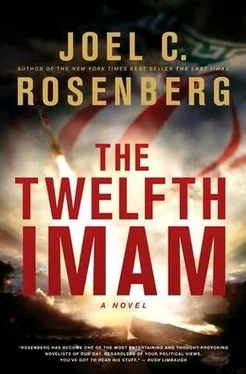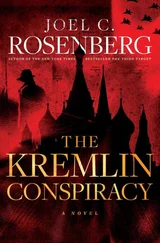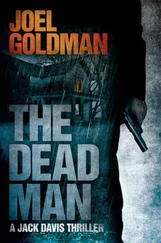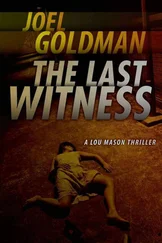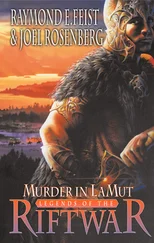He unlocked the car, stepped inside, and closed the door behind him. As he sank into the soft leather seats and ran his hand across the dash, savoring the entire experience-the look, the feel, the smell of this Mercedes-he said a silent prayer, thanking Allah for giving him the great privilege and joy of helping his people, the Shias, build the Bomb.
He sat in the sunshine for a moment and closed his eyes. He tried to imagine the ceremony that was just another week or two away now. He tried to imagine what it would be like when his eyes saw his Mahdi. But when he put in the key and turned the ignition this time, nothing happened. The car neither started nor sputtered. That was odd, he thought. He pumped the accelerator a few times, and as he turned the key again, the car erupted in a massive explosion of fire and smoke that could be heard on the other side of Hamadan.
The phone rang and wouldn’t stop.
Najjar’s fever was still 102. His head was pounding. He was in severe pain, and he had no intention of getting out of bed to find a phone. But the constant ringing was driving him crazy. The phone would ring eight or ten times, pause for a moment, then ring another eight or ten times, pause again, and repeat the cycle. Someone was desperately trying to get him, but he could barely move. Finally summoning every ounce of energy in his body, Najjar sat up and inched himself to the edge of the bed. The phone kept ringing. He stood, wrapped himself in one of the blankets from the bed, and crawled across the room to the phone sitting on Sheyda’s dresser.
“Hello?” he groaned, doing everything he could to suppress a wave of vomiting.
“Is this Najjar Malik?” said a voice at the other end.
“Yes.”
“You’re the son-in-law of Dr. Mohammed Saddaji?”
“Yes. Why? Who is this?”
“You’ve been warned,” the voice said in Farsi but with a curious foreign accent. “You’re next.”
The phone went dead.
Suddenly Najjar heard pounding on the apartment door. His head felt like it was in a vise grip constantly being tightened. The pounding at the door wasn’t helping. He forced himself up, stumbled down the hallway past the living room, and checked the peephole. It was a police officer. Not security from the research center and not the secret police. It appeared to be a municipal police officer, so Najjar undid the several locks and opened the door.
“Dr. Malik?” the officer asked.
“Yes, that’s me.”
“I’m afraid I have terrible news.”
“What?” Najjar asked, his knees growing weak.
“It’s about your father-in-law,” the officer said.
“Dr. Saddaji? What about him?”
“I’m afraid he has been killed.”
“ What? How?”
“I know this will be hard to believe…”
“Tell me.”
“At this point, until we complete our investigation, this cannot be repeated,” the officer continued.
“Just tell me, please.”
“Dr. Malik, I’m very sorry to be the one to tell you this, but I’m afraid your father-in-law was killed by a car bomb.”
Najjar staggered backward and had to grab a chair to keep his balance. “My wife,” he cried. “She was with him. Is she okay? Dear Allah, please tell me she’s okay.”
“Physically, she’s fine,” the officer assured him.
“Where is she?”
“She was taken to the hospital to be treated for shock. If you’d like, I can take you to her.”
A surge of adrenaline coursed through Najjar’s frail body. Suddenly alert and significantly stronger than he had been a moment before, he hurried to his bedroom, dressed quickly, washed his face, brushed his teeth, and went out the door with the officer. Fifteen minutes later, the patrol car was taking a left on Mardom Street and pulling into Bouali Hospital. Najjar ran in and quickly found Sheyda and her mother, Farah, both looking small and lost.
A security detail from the research center was already there protecting the family and had set up a perimeter around the hospital.
The rest of the day was a blur of tears and police investigators and well-wishers and funeral details. According to tradition, the burial had to be completed by sundown, but there was no body, the officer told Najjar privately, away from Sheyda and Farah. Only a few parts had been found, along with some bits of clothing and shoes. Those, Najjar was told, would be gathered, put in a small box, and wrapped in a white shroud.
Soon Dr. Saddaji’s secretary arrived at the hospital and began helping Najjar e-mail and text family members, friends, and coworkers, informing them of the death and requesting their presence at the funeral. The head of Najjar’s protective detail had just one demand: for reasons of state security, there could be no mention of how Dr. Saddaji had died in any of their private conversations or public communications. Not now. Not at the funeral. Not unless the head of Iran’s nuclear power and research agency personally authorized it, and even then, Najjar was informed that Ali Faridzadeh would likely veto such an authorization.
The defense minister? Najjar thought. Until recently, a mention of someone so high up on the food chain would have struck him as bizarre and out of place. But now the pieces of the puzzle were coming together. Najjar no longer had any doubt that his father-in-law had been one of the top nuclear-weapons scientists in Iran, and he had given his life in his ghastly pursuit of killing millions.
Had the Israelis taken him out? Had the Americans or the Iraqis? He would probably never know. But while he mourned on the outside, inside he felt a great sense of relief. This solved a lot of problems, he realized. Maybe this would set back the entire weapons program and forestall a war that otherwise was surely coming soon.
Munich, Germany
While he waited for the phones, David threw himself back into his work.
He grieved for his parents and for Marseille. But there was nothing he could do for any of them at the moment. He had to stop being David and get back to being Reza Tabrizi. He had to get himself ready to go back inside Iran, and that, he was convinced, meant becoming an expert on the Twelfth Imam.
Zalinsky had told him not to get sidetracked. But David couldn’t help himself. He simply could not go back into Iran without understanding better who this so-called Islamic messiah was and why people at the highest levels of the Iranian government seemed so focused on his appearance. Something was happening. Something dramatic and historic. Zalinsky didn’t get it. But David’s instincts told him this was real.
He went hunting for every scholarly work and serious analysis he could possibly find on the Internet, since his search of the database at Langley had turned up little of value. On the third day, David found himself poring over a study published by a Washington think tank in January 2008. It was a bit out-of-date, but it gave him an important context he certainly wasn’t getting from anyone at Langley.
Apocalyptic politics in Iran originates from the failure of the Islamic Republic’s initial vision. The 1979 Islamic Revolution began with a utopian promise to create heaven on earth through Islamic law and a theocratic government, but in the past decade, these promises ceased to attract the masses. Faced with this failure, the Islamic government has turned to an apocalyptic vision that brings hope to the oppressed and portrays itself as an antidote to immoral and irreligious behavior. This vision, which is regarded as a cure for individual and social disintegration, appears in a period when the Islamic Republic does not satisfy any strata of society, whether religious or secular.
David was intrigued by the notion that “when the Iranian government failed to deliver its promises, many Iranians looked for alternatives and found the cult of the Mahdi-the Messiah or the Hidden Imam-and its promise to establish a world government.” The number of people who claimed to be in direct connection to the Twelfth Imam or even to be the Mahdi himself, the author noted, had increased remarkably in recent years in both urban and rural regions.
Читать дальше
